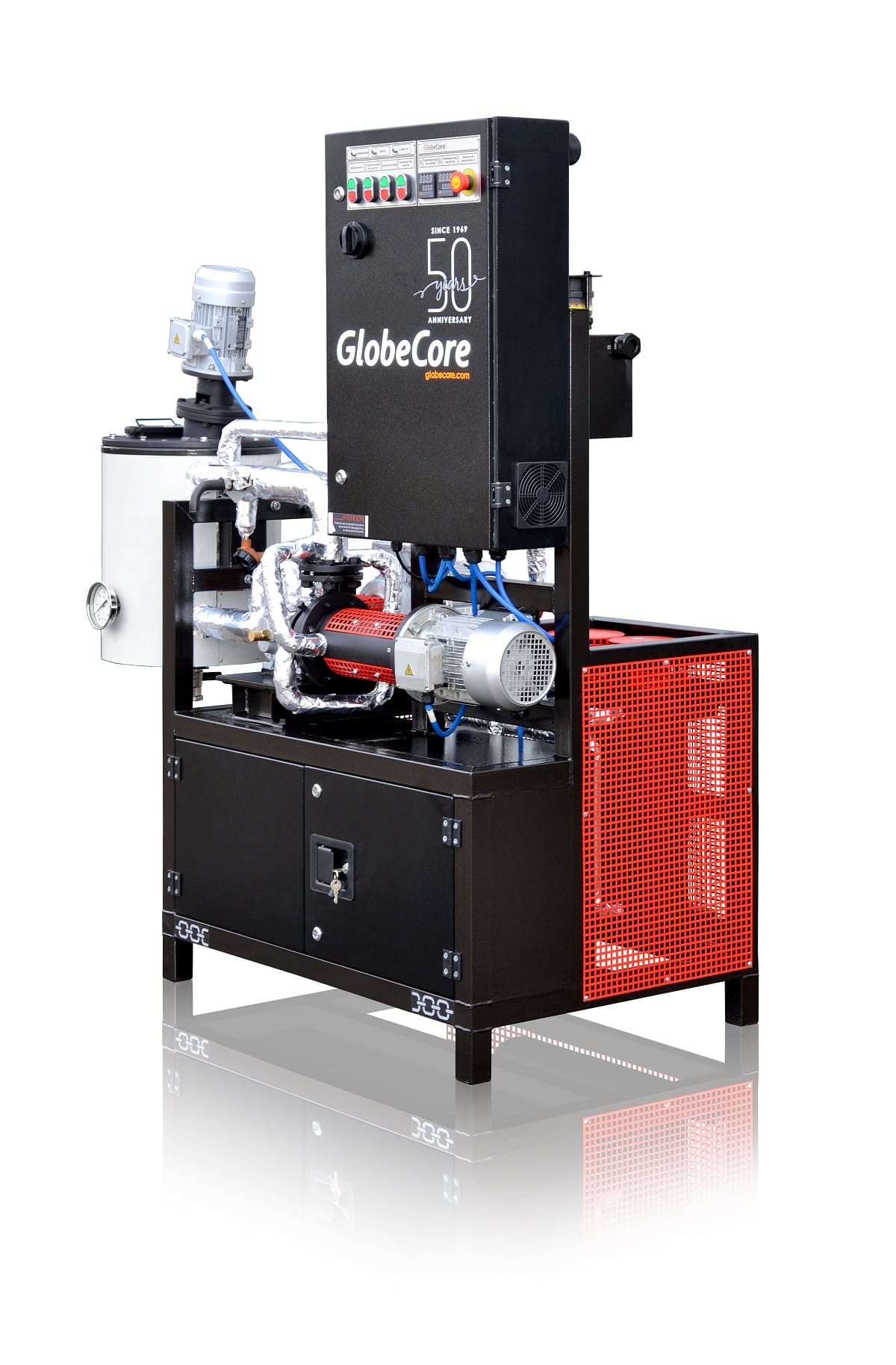USB-3 Bitumen modification laboratory system

USB-3
-
Advantages
- can be used by laboratories and research facilities;
- produces modified bitumen samples for laboratory testing;
- testing efficiency of various bitumen additives and optimization of bitumen binding material formulas.
The USB-3 bitumen modification laboratory system is designed for preparation of small samples (no more than 10 liters per batch) of modified bitumen1Modified bitumen is characterized by improved flexibility and longer service life, it also has a lower brittleness temperature and higher softening temperature..
The system uses continuous bitumen2A bitumen is a sticky, black, and highly viscous liquid or semi-solid form of petroleum. mixing process with further dispersion3A dispersion is a system in which distributed particles of one material are dispersed in a continuous phase of another material. of bitumen and polymer in the mill4A mill is a device that breaks solid materials into smaller pieces by grinding, crushing, or cutting.. Unit design allows for addition of other liquid components in the process of bitumen modification.
The unit can be used by petrochemical facilities for optimization of modified bitumen production process, determining the required amount of modifying additives and using the prepared bitumen as a laboratory sample.
Modification laboratory system by GlobeCore.
This product is designed for testing of known formulas of emulsions, primers and liquid rubber. It can also be used for the development of new materials and emulsifiers and the corresponding research and experiments.
Bituminous grouts — field of application
- Bituminous grouts are classified both by fields of application and by methods of use (cold and hot coating).
- Some grouts require preliminary surface preparation with primers. A primer is a bituminous priming material containing a bitumen and a solvent and having a high penetrability and a short drying time.
- Types of grouts and their uses:
а) Coating grout (cold application):
- waterproofing of surfaces;
- treatment of joints and cracks;
- puttying of surfaces;
- attaching of rolled bitumen materials;
- anticorrosive protection of metal structures.
- b) Coating grout (cold application). It can be used at sub-zero ambient temperatures. It is used for repair and forms an ultrastrong waterproof coating on the steel, concrete, and wood structures sunk deeper into the ground.
с) Bituminous-rubber grout (cold application) is used for waterproofing of foundations, walls, tanks, pipelines, etc.
- d) Adhesive grout (cold application). Designed for attaching the extruded polystyrene to bituminous, bituminous-polymer insulating materials in foundation insulation systems.
Modified bitumen — Fields of application
- Road construction:
- production of asphalt concrete which is used for new construction and repair of first-class roads, bridges, overpasses, road junctions, etc.;
- production of stone matrix asphalt concrete (SMA) for pavement topping of first-class highways and roads;
- production of porous asphalt concrete;
- plaсing of crack-stopping membrane interlayers.
- Hydraulic engineering facilities:
- production of PMB-based grouts for coating of water storage facilities, swimming pools, water supply pipe linings.
- Roofing:
- production of PMB-based rolled roofing materials (Ruberoid, Euroruberoid).
- Bitumen shingles:
- production of grouts for laying and repair of roofing surfaces.
Equipment configurations that are not included in this configurator can be implemented via a separate request to [email protected].
- can be used by laboratories and research facilities;
- produces modified bitumen samples for laboratory testing;
- testing efficiency of various bitumen additives and optimization of bitumen binding material formulas.
Application Fields of GlobeCore Bitumen Emulsion Equipment
GlobeCore bitumen emulsion plants can be used in:
- production of bitumen emulsions for construction and repair of asphalt roads;
- production of bitumen emulsions for stabilization of soils and dirt roads;
- production of bitumen emulsions for protection of pipelines and metal structures;
- production of bituminous grouts;
- production of emulsions for roofing materials which are used when laying or repairing the roofs;
- production of waterproof emulsion coatings for waterproofing of foundations and terraces;
- production of waterproofing coatings for artificial water bodies and swimming pools;
- production of waterproof coatings for protection of metals against corrosion;
- production of waterproof bituminous membranes for roofs and terraces;
- production of bituminous binder for cold-lay asphalt;
- production of elastic sound and heat insulation coatings;
- production of lubricants for heavy-duty machines and industrial equipment;
- production of water-soluble lubricants for the metalworking industry;
- production of water-based adhesives for construction and repair work;
- production of bituminous sealants for ensuring the structural integrity of buildings;
- production of anticorrosive coatings for metal structures;
- production of fire-resistant coatings to protect structures against fire;
- production of binders for cold-lay asphalt;
- production of emulsion for road surface marking;
- production of emulsion-type pesticides and herbicides;
- production of emulsion-type lubricants for high-speed equipment;
- production of cutting fluid for metalworking;
- production of lubricants for textile industry and textile equipment;
- production of water-based multipurpose adhesives for various industrial applications;
- production of emulsion-type adhesives for the woodworking and furniture industry;
- production of water-based paints for exterior and interior work;
- production of substances which prevent sticking of snow and ice to motorways and airfields;
- production of textile impregnating emulsion which ensures waterproof and fire-resistant features;
- production of elastic, wear-resistant coatings for basketball and tennis courts;
- production of paper impregnating emulsions which impart water-repellent properties to paper and increase its strength;
- production of cable sealing materials which are used in electrical equipment and telecommunications;
- production of protective and preservative emulsions for wood which ensure water and fungus proofing.
Equipment configurations that are not included in this configurator can be implemented via a separate request to [email protected].
